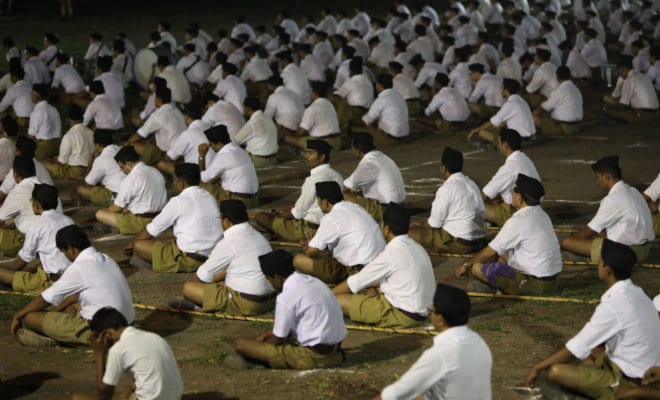India
India’s Most Influential Hindu Nationalist Group Is Going On A Charm Offensive

A meeting of the members of Rashtriya Swayamsevak Sangh (RSS).
Photo: Bigstock
Founded in 1925, the RSS is the backbone of the Hindu nationalist movement and the progenitor of India's current ruling party, the Bharatiya Janata Party.
The strident Hindu nationalist organization that helped propel Prime Minister Narendra Modi to power is attempting a makeover to soften its image ahead of next year’s national elections.
The Rashtriya Swayamsevak Sangh, or RSS, held an unprecedented three-day event this week in the heart of New Delhi, where its leader explained its views to critics and adherents alike.
Founded in 1925, the RSS is the backbone of the Hindu nationalist movement and the progenitor of India’s current ruling party, the Bharatiya Janata Party. Modi spent most of his career as an RSS organizer. The group is known for its dislike of publicity and its influence at the highest levels of India’s government.
In three consecutive lectures this week, Mohan Bhagwat, the leader of the RSS, attempted to counter criticism that he heads a chauvinistic and divisive organization – and instead said his group supported a vision of India that encompasses religious minorities as well as RSS critics.
“We believe in an India which includes everyone and does not exclude anybody,” Bhagwat said. “For the sake of uniting society, no one is a stranger to us, not even those who are opposed to us.”
The event is part of a continuing campaign by the RSS to move from the fringes of public debate in India toward the mainstream. Among the audience in the cavernous conference hall were not only RSS members but diplomats, journalists and activists skeptical of the RSS.
The unusual outreach event came as the RSS has faced increasing criticism from India’s opposition parties. Rahul Gandhi, the leader of the Indian National Congress, last month likened the RSS to Egypt’s Muslim Brotherhood, saying the RSS was trying “to change the nature of India” and “wants to capture its institutions.”
Under the Modi government, dozens of people – mostly Muslims – have been assaulted and sometimes killed by self-styled “cow protection” squads seeking to punish people who harm cattle. Members of groups affiliated with the RSS have also boasted of their ability to attack Muslims with impunity and claimed Muslims who marry Hindus are engaging in “love jihad.”
Bhagwat sought to distance the RSS from such incidents. Vigilante violence is a crime and should be punished, he said. He also claimed that the RSS vision of a “Hindu rashtra” – a Hindu nation – does not exclude Muslims.
“The day it is said that Muslims are unwanted here, the concept of Hindutva [Hindu-ness] will cease to exist,” Bhagwat said.
The RSS operates chapters across India where its male members meet in parks and participate in daily quasi-military drills. (They used to wear a uniform of khaki shorts and white shirts, but have since allowed members to wear pants.)
In 1948, the Indian government briefly banned the RSS after a former member assassinated India’s revered independence leader Mahatma Gandhi. It currently has dozens of affiliated groups operating under its umbrella, including a women’s wing, a labor union and a farmer’s union. Its members have worked to elect BJP candidates across the country.
A senior RSS official said on the sidelines of the first-of-its-kind event in Delhi that the aim was to deliver an “undiluted and unpolluted” version of the organization’s views to its growing membership.
“This has got nothing to do with the opposition,” said Manmohan Vaidya, a joint general secretary of the RSS. “We have a message and a view and we wanted to communicate it directly.”
The outward goal is to “portray the RSS as a more benign organization,” said Walter Andersen, a political scientist at Johns Hopkins University and the co-author of a recently released book on the group, which he says has about 2 million members.
The RSS is slowly changing some of the fundamental elements of its rhetoric, said Badri Narayan, a professor at the University of Allahabad who has studied the group’s long effort to expand its reach. “We have to see how much they are going to implement these new ideas in action,” he added.
Saba Naqvi, the author of a book on India’s ruling Hindu nationalists, said she was struck by the effort even if she found some of the content hypocritical or inaccurate. “Many of us would say, ‘Okay, they’re lying,’ but that’s not the point,'” she said. “The point is they’re coming out and saying something and they don’t do that.”
Other critics noted that Bhagwat continued to expound a vision in which everyone born in India is considered Hindu by virtue of certain shared “eternal values” – regardless of whether they practice another faith or identify themselves differently.
“When a bully tells you that I want to make you my own, one needs to [be] on guard,” wrote Apoorvanand, a professor at Delhi University who uses only one name, in the Print. “One way of integrating the other is to devour it . . . this is the not-so-hidden message from the chief of the RSS.”
On the last day of the event, Bhagwat acknowledged that his statements would be met with skepticism.
“You need not believe all that I have said during the last three days,” he said. “But I believe firmly that once you understand the [RSS], you will want to be a part of it.”
(c) 2018, The Washington Post
